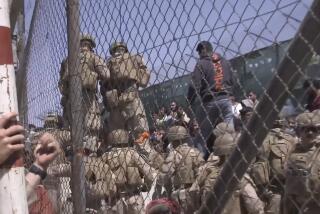Mullah Omar dead? Widespread sources skeptical
Reporting from Kabul, Afghanistan — If the latest reports of Mullah Mohammed Omar’s demise are greatly exaggerated, they nonetheless show the strength of rumor and media frenzy in Afghanistan and Pakistan after the death of Osama bin Laden.
A Taliban spokesman Monday vehemently denied claims that the movement’s spiritual leader had died or been killed, even as Afghanistan’s main intelligence service asserted that the reclusive cleric had disappeared from his alleged Pakistani hide-out.
The spokesman, Zabiullah Mujahid, said by telephone that the one-eyed, self-declared “leader of the faithful,” who has long been thought to be hiding in Pakistan, was alive and well, directing the Taliban’s military campaign in Afghanistan. Western diplomats in Kabul, together with tribal and intelligence sources in Pakistan, expressed skepticism over the death rumors, which have surfaced many times before.
But the wildfire-like spread of Monday’s reports, aided by social media such as Twitter, reflected the degree of speculation surrounding Omar’s fate, which has risen dramatically in the three weeks since Navy SEALs killed Bin Laden in a raid in Pakistan. They also spotlighted an increasingly combative and complicated relationship between Afghanistan and neighboring Pakistan over the sheltering of militants.
Amid the flurry of claims, Afghanistan was shaken as usual by violence. Western military officials reported the deaths of one service member in the south and four others in a roadside bombing in the east, without immediately revealing their nationalities. Afghan officials, meanwhile, said four tribal elders were killed in a suicide bombing in Laghman province, also in the east.
The death rumors about Omar appeared to emanate mostly from Afghanistan’s main intelligence service, the National Directorate of Security. Its spokesman, Lutfullah Mashal, told reporters in Kabul that Omar had disappeared several days ago from Pakistan’s Baluchistan province, the seat of the Taliban leadership council, known as the Quetta Shura, and had not been heard from since.
“Our sources and senior Taliban commanders have confirmed that they have not been able to contact Mullah Omar,” Mashal said at a news conference. “So far, we cannot confirm the death or killing of Mullah Omar.”
Earlier, Mashal told the Associated Press that Omar was thought to have been transported from his base in the city of Quetta to the tribal region of North Waziristan with the knowledge of Hamid Gul, a former Pakistani intelligence chief known to be sympathetic to the insurgents. Gul went on Pakistani television to deny the report, adding that he did not even know Omar.
Afghanistan’s Tolo television took it a step further, citing unidentified sources at the National Directorate of Security as saying Omar had been killed while being moved to North Waziristan. But officials in the close-knit tribal area said there was no sign the claim was true.
Omar, together with Bin Laden, has long had near-mythical status in the tribal borderlands. Nearly a decade ago, in the wake of the Sept. 11 attacks, Omar defied Western demands to hand over Bin Laden, instead providing him with a haven, though it proved temporary.
Omar’s resistance triggered the U.S.-led invasion of Afghanistan in October 2001, and he and Bin Laden became the subject of international manhunts, with multimillion-dollar bounties on their heads. Omar fled on the back of a motorbike into the mountains outside the southern city of Kandahar, at the time the Taliban’s base of operations, and was thought to have made his way across the border to Pakistan. Bin Laden was tracked to the mountains of Tora Bora, in eastern Afghanistan, but he too slipped away.
A Pakistani intelligence official who asked not to be named said Monday that the country’s intelligence community had no information to suggest that Omar was dead. Pakistan has always denied knowledge of Omar’s whereabouts, just as it did those of Bin Laden.
Mujahid, the Taliban spokesman, called reports of Omar’s death propaganda meant to shake the confidence of the group’s fighters in the field. Since Bin Laden’s death, the movement has also dismissed reports that its leadership had entered into talks aimed at beginning peace negotiations with the West or the government of Afghan President Hamid Karzai.
Officials with NATO’s International Security Assistance Force said they were aware of reports of Omar’s death.
“There is certainly a great temptation to start giving comments on this or getting into speculation, but this is not what I am going to do here now, because what we really need, of course, is a confirmation on what has really happened,” spokesman Brig. Gen. Josef Blotz told reporters in Kabul, the Afghan capital.
The revelation that at the time of the SEALs raid, Bin Laden had been living for about five years in the Pakistani garrison town of Abbottabad revived long-standing anger in Afghanistan over Pakistan’s presumed sheltering of other militant figures.
Despite Pakistan’s angry protests that the raid violated its sovereignty, President Obama told the BBC recently that the United States would act again if it had reason to think another senior terrorist leader was hiding on Pakistani soil.
Times staff writer Alex Rodriguez in Islamabad, Pakistan, special correspondent Aimal Yaqubi in Kabul, special correspondent Zulfiqar Ali in Peshawar, Pakistan, and a special correspondent in Kandahar contributed to this report.
More to Read
Sign up for Essential California
The most important California stories and recommendations in your inbox every morning.
You may occasionally receive promotional content from the Los Angeles Times.










